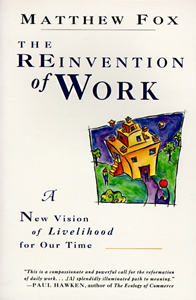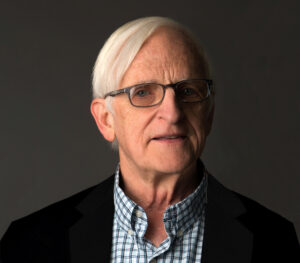Harper Collins Publishers, 1994
Review by Bill Locke
“How many of us can really say that our work life is in balance with our personal life – that our values and desires are reflected in our daily vocation, that our personal life and professional life are integrated, or that we find satisfaction, not a crushing defeat of the spirit, in our workday existence? According to most polls and reports, very few of us do.”1
 The above quote sounds like a contemporary comment. Actually, it was written in 1994. Recent Gallup polls indicate that 60% of citizens report being emotionally detached at work, and 19% being miserable.2 As well, many feel that their work-life balance is out of whack. After going through lockdowns during the pandemic, spending time away from work or working from home, many in Western countries are now questioning the very place of work in their lives. Dissatisfaction, boredom, feeling overworked or having trouble finding fulfilling work are all common complaints. According to author, theologian and Episcopal priest Matthew Fox in his book The Reinvention of Work: A New Vision of Livelihood for Our Time, it’s because we have removed the sacred from our day-to-day existence. This is not to say that a sacred life will be easy. The Sufi sage Rumi exhorts us to “work in the invisible world at least as hard as you do in the visible.”3
The above quote sounds like a contemporary comment. Actually, it was written in 1994. Recent Gallup polls indicate that 60% of citizens report being emotionally detached at work, and 19% being miserable.2 As well, many feel that their work-life balance is out of whack. After going through lockdowns during the pandemic, spending time away from work or working from home, many in Western countries are now questioning the very place of work in their lives. Dissatisfaction, boredom, feeling overworked or having trouble finding fulfilling work are all common complaints. According to author, theologian and Episcopal priest Matthew Fox in his book The Reinvention of Work: A New Vision of Livelihood for Our Time, it’s because we have removed the sacred from our day-to-day existence. This is not to say that a sacred life will be easy. The Sufi sage Rumi exhorts us to “work in the invisible world at least as hard as you do in the visible.”3
Rev. Dr. Matthew Fox, in his positively disruptive way, proposes an answer: reinventing our notion of “work”. Building on a wealth of thinking by muses and mystics, prophets and philosophers, he takes a whole new and yet old way to look at our labours. It is as if to answer the prayer of Thomas Aquinas, who pleaded:
“Grant me, O Lord my God, a mind to know you, a heart to seek you, wisdom to find you, conduct pleasing to you, faithful perseverance in waiting for you, and a hope of finally embracing you.”
Fox calls on his readers to restore the fullest meaning of work, to leave behind damaging views of so-called meaningless jobs, and to share in the vision of going beyond our personal and professional aspirations to a place of “soul work.”

Rev. Dr. Matthew Fox
He brilliantly reconnects work to spiritual life, reminding us that our feelings of imbalance often emanate from within ourselves. Fox encourages each of us to look at our lives, not from the point of view of our jobs or careers or workplaces, but to go deeper, seeing what is happening to us at our core:
“Life and livelihood ought not to be separated but to flow from the same source, which is Spirit, for both life and livelihood are about Spirit. Spirit means life, and both life and livelihood are about living in-depth, living with meaning, purpose, joy and a sense of contributing to the greater community. A spirituality of work is about bringing life and livelihood back together again.”4
As E.F. Schumacher (author of the bestseller Small is Beautiful; 2011) wrote in his book Good Work:
“Everywhere, people ask: ‘What can I actually “do”?’ The answer is as simple as it is disconcerting: We can, each of us, work to put our own inner house in order.”5
Looking back to the Industrial Revolution, Fox tells us the model of work began there. It’s a model which we still use. It is one of increasingly rapid output with workers as cogs in a great production wheel. We should be connected, yes, but not to the ‘wheel’ so much as to one another. Fox quotes economist Hazel Henderson, one of the authors of Redefining Wealth and Progress6, who characterizes the industrial economic approach as having “unchecked production, consumption and continuous economic growth”. Fox seeks to transform that approach, envisioning a future focused on the ‘infinite’:
“This newly found sense of spirituality will in turn end the cycle of avarice on which modern consumer economics is based; we will find our quest for the infinite or for Spirit in places that truly satisfy.7
The biggest wheel of work, Fox writes, is the universe, which is best seen through cosmology:
A cosmological perspective on work can show us that all creatures in the universe have work – the galaxies and stars, trees and dolphins, grass and mountain goats, forests and clouds – all are working. The only ones out of work are human beings. The very fact that our species has invented unemployment ought to give us pause. Unemployment is not natural.8
Fox stands back from the nine-to-five existence to tell us what employment is really about: God’s work in us and through us. He beautifully explains that the Spirit who ‘hovered over the waters’ at the beginning of the world is committed to a work of co-creation with us.
For perspective, Fox also looks through the lens of the prophets and mystics. Meister Eckhart, undoubtedly his favorite mystic, tells us that the Spirit is not only water, but also wind and fire.
“Indeed, it is the wind that fans the ‘spark of the soul’ that burns incessantly in all of us. This spark is hidden, something like the original outbreak of goodness, something like a brilliant light that incessantly gleams. … This fire is nothing else than the Holy Spirit.9
Also calling on the wisdom of Hildegard of Bingen, Thomas Aquinas, Rumi, Bhagavad Gita, and other diverse sources of cosmological wisdom, Fox encourages us to move away from a fixation on the materialistic ethos of the industrial revolution. He makes no bones about it – we should get on with the dream and the doing of something much bigger with our lives.
According to Fox, we must change our paradigm about the way we work, how we think and talk about work, our investment in our jobs, and for that matter, our external existence. Instead of focusing exclusively on the externals, we must also do the inner work, to get on with expressing who we really are. This takes us to the deep level of consciousness and sometimes comes across as ‘quantum woo-woo’. But it is feasible and do-able, Fox writes. If we strive to keep our lives authentic – embedding ourselves in the value of relationships, pouring ourselves out for others, facing our fears, honouring our inspirations, and doing what we feel is right – we can be part of something transcendent:
“We become real when our work joins the Great Work. We become real when our inner work becomes work in the world; when our creativity, born of deep attention to both enchantment and nothingness, serves the cause of transformation, healing, and celebrating.”10
I was captivated by the first two-thirds of the book especially. There, Fox reframes and unpacks the theology of work. The last third of the book is packed with creative ways to enhance work in the realms of material production, business, health, politics, academia, youth, art, and science. He questions the various professions in these fields, seeking a renewed focus on social justice, renewal and basic civility. As an example, he describes a successful experiment by the Sandinistas in Nicaragua that sent literate teenagers into villages and farm communities to teach illiterate adults. In Fox’s words, the results were amazing.
As imaginative and fascinating as these final chapters can be, I found them occasionally to be somewhat pie-in-the-sky. Fox defers to Rolf Osterberg, CEO of one of Sweden’s biggest film companies, who claims that:
“Work, as every other aspect of life, is a process through which we acquire experiences … the primary purpose of a company is to serve as an arena for the personal development of those working in the company. The production of goods and services and the making of profits are by-products.”11
If only it were so.
Though Fox wrote this fascinating book almost 30 years ago, I find that he is still ahead of his time. We haven’t shifted our economy enough in the directions he explores. As Fox himself argues, instead of shining the spotlight on our output or how fast we can turn the wheel of material production, we should be paying more attention to our role in effecting joy and peace for ourselves, and those around us.
The Reinvention of Work: A New Vision of Livelihood for Our Time may be timelier now more than ever. I recommend it highly; consider finding a copy to examine, enjoy, and employ.







